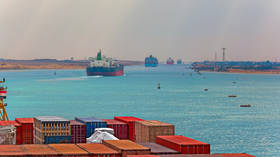Billions in cargo diverted amid Red Sea disruptions – CNBC

Shipping companies have redirected about $35 billion worth of cargo away from the Red Sea amid the risk of attacks from Houthi militants in Yemen, CNBC reported this week.
According to the report, there are currently 57 container vessels sailing the long way around the southern tip of Africa instead of passing through the Red Sea and the Suez Canal.
“That number will increase as more will take this routing,” Paolo Montrone, senior vice president and global head of trade sea logistics at Kuehne+Nagel, told CNBC. “The total container capacity of these vessels is 700,000 twenty-foot equivalent units,” he said.
According to senior consultant for MDS Transmodal Antonella Teodoro, the approximate value of those containers is $50,000, which adds up to $35 billion in total cargo being rerouted.
Carriers have been diverting vessels following travel suspensions over reports of at least two ships having been targeted with projectiles on Monday. Houthi leaders said they were pursuing Israel and all Israel-bound vessels due to the ongoing hostilities in Gaza.
“Ocean carriers could also start making adjustments to their networks in addition to the diversions,” said Teodoro. “But, diversions/adjustments will require time and won’t come free, understandable. One can hope we won’t see the high rates seen in the recent past,” she said.
Montrone also indicated that port authorities are expecting congestion as a result of updated arrival times and planning needs.
“The situation is very volatile and the reconfiguration of these networks is very complex, so we can expect a certain level of disruption,” Montrone said. “In Asia, the lack of empty equipment (containers) will become a potential issue as the repositioning of empty containers into demand areas will take 10-20 days longer.”
Meanwhile, the CEO of Danish shipping group Maersk, which has also rerouted ships around Africa, expects two to four weeks of delays.
“Europe is more dependent on the Suez,” Vincent Clerc told CNBC, adding “The delays will be more pronounced in Europe.”
For more stories on economy & finance visit RT's business section













